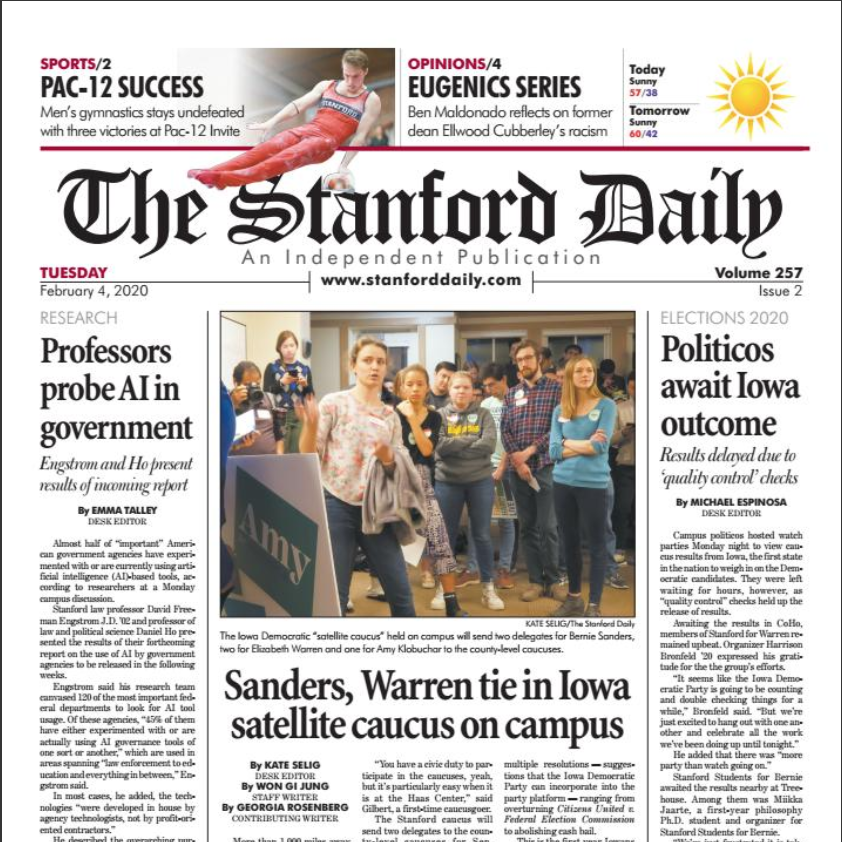
By Katie Keller
In diametrically opposed but equally emotional testimony, Supreme Court nominee Brett Kavanaugh and his accuser, Bay Area-based and Stanford-affiliated research psychologist Christine Blasey Ford, faced off in a hearing before the Senate Judiciary Committee today. The explosive hearing, in which senators questioned Ford and Kavanaugh for almost nine hours in total, will play an important role in the votes of key senators in the Senate-wide confirmation vote scheduled for Friday.
The confirmation of the embattled Kavanaugh, which was thrown into turmoil when Ford and two other women accused the judge of sexual assault, would give him a lifelong seat on the Supreme Court and create the most conservative bench in generations.
Since Republicans hold a thin 51-49 majority in the Senate, they cannot afford to lose more than one vote to ensure the Kavanaugh nomination. Republican senators Jeff Flake of Arizona, Lisa Murkowski of Alaska and Susan Collins of Maine all said that they would determine their votes after the hearing. Some red-state Democrats, including Joe Manchin of West Virginia, Joe Donnelly of Indiana and Heidi Heitkamp of North Dakota, also have yet to determine how they will vote.
Stanford’s take
Members of the Stanford community have remained divisive on the issue of Kavanaugh’s confirmation.
Michele Dauber, the Stanford Law School professor who has been an outspoken critic of public figures accused of sexual misconduct, questioned why Republicans were so willing to defend Kavanaugh when there were plenty of other equally conservative, less controversial judges who could be more easily confirmed.
“I can’t understand [Republicans’] attachment to him because there are plenty of other Republican judges who are anti-choice and pro-business … including some women, who have never been, nor will ever be, credibly accused of sexual assault,” she said. “The only way I can explain it is that the Republican party in this country simply does not care about violence against women — just does not care.”
Dauber said that, if Republicans confirm Kavanaugh, “they are basically signing their death warrants.”
In a subsequent statement to The Daily, Dauber clarified that she meant that Republicans would sign their “political” death warrants, and did not intend any overtones of violence.
“I think they will lose the midterms — they will definitely lose the House and might even lose the Senate — and might really damage their standing with women for a generation,” she said.
Prior to the hearing, the Stanford College Republicans released a statement on Facebook praising Kavanaugh for his pro-life beliefs and vehemently criticizing Democrats’ attempt to stop his confirmation.
“For the left, the vicious attempt to sink Brett Kavanaugh’s nomination to the Supreme Court has NEVER been about genuine concerns over sexual assault allegations: rather, it has always been about protecting the ‘right’ of the wicked and selfish to murder children,” they wrote.
“Republicans must stand firm, and confirm Brett Kavanaugh,” the Facebook post continued. “To do otherwise is to acquiesce to those who act solely out of a desire to protect the ‘right’ to kill.”
Meanwhile, Gabe Rosen ’19, co-president of Stanford Democrats, praised Ford for the “immense courage” she showed in testifying.
“The harrowing details that she recounted of her sexual assault bring to light the fundamental deficiencies of this administration’s nominee for the Supreme Court,” he said. “It’s my sincere hope that he’s removed from consideration for the court and prevented from receiving a vote — a vote, I’d like to remind people, that Merrick Garland was denied during his nomination years ago out of pure partisanship.”
As students across campus tuned into the news to watch the testimonies of Ford and Kavanaugh, The Women’s Community Center (WCC) opened its doors to the community in solidarity with students who might find the hearings distressing. Offering tea, snacks, crafts and lunch, WCC hoped to provide space and resources to members of the community troubled by the public sexual assault scandal.
The hearing
Ford spoke first in the hearing. She opened her testimony with a prepared statement, published by The New York Times yesterday, in which she admitted that she was “terrified” to be testifying but nevertheless recounted details of her assault. She claimed that Kavanaugh groped her, tried to remove her clothes and covered her mouth to stop her from screaming at a high school party and in the presence of his friend, Mark Judge.
“Brett’s assault on me drastically altered my life. For a very long time, I was too afraid and ashamed to tell anyone the details,” she said. “I tried to convince myself that because Brett did not rape me; I should be able to move on and just pretend that it had never happened.”
Asked by Senator Blumenthal (D-CT) how sure she was that Kavanaugh was the man who assaulted her, she said that she was “100 percent” certain.
Democratic senators frequently framed their questions in the context of gratitude to Ford for her courage in coming forward.
“You are speaking truth that this country needs to understand,” Cory Booker ’91 M.A. ’92, a New Jersey Democrat, told Ford, “and how we deal with survivors who come forward right now is unacceptable… Your brilliance, shining light onto this — speaking your truth — is nothing short of heroic.”
Booker has been a prominent figure in the opposition to Kavanaugh’s nomination, at several points releasing documents from Kavanaugh’s past that otherwise would likely have been kept confidential by the Judiciary Committee. An opinion piece Booker wrote for The Daily in 1992 — wherein he used a memory of groping a drunk friend at 15 to illustrate the role toxic masculinity plays in rape culture — has also resurfaced amid his vocal criticism of Kavanaugh.
Republicans’ line of questioning, which was conducted by the Arizona prosecutor Rachel Mitchell who they retained for the hearing, focused more on clarifying the details of the assault. Mitchell asked Ford to approximate the location of the event on a map and asked her how she got to the party, six miles away from her house, if she could not yet drive. Ford could not recall who drove her to the party.
As Ford’s part of the hearing concluded, Senator Grassley submitted to the record three sworn statements from Kavanaugh and two other alleged party attendees claiming no knowledge of the incident. In response, Senator Blumenthal objected, saying that these individuals should all be called forward to testify if their statements were to be submitted. Other Democratic senators moved to submit letters attesting to Ford’s credibility in addition.
Kavanaugh began his statements after Ford finished her testimony. Visibly angry, he accused Democratic senators of orchestrating a “grotesque and coordinated character assassination,” calling the confirmation process a “circus.”
“This allegation was unleashed and publicly deployed over Dr. Ford’s wishes,” he said. “And then, and then — as no doubt was expected, if not planned, came a long series of false, last-minute smears designed to scare me and drive me out of the process.”
“I am innocent of this charge. I intend no ill will toward Dr. Ford and her family,” he continued. Fighting back tears, he recounted that his young daughter had suggested the family pray for Ford the night before the hearing. “That’s a lot of wisdom from a 10-year-old,” he said.
During Kavanaugh’s testimony, Mitchell continued to ask questions on behalf of Republican senators. She began her line of questioning by asking Kavanaugh if he committed the acts that Ford alleged; Kavanaugh responded “no” to each detail, denying ever having been in a room with Ford and Judge or ever having any sexual contact with Ford.
From the Democratic side, Dick Durbin (D-IL) pushed Kavanaugh to ask White House council Don McGahn to have the FBI prove his innocence.
“If there is no truth, the FBI investigation will show that,” Durbin said. “Are you afraid that it might not?”
Kavanaugh responded that he was “telling the truth” but refused to ask for the FBI investigation, saying that the Judiciary Committee was responsible for investigating.
As the emotional valence of the hearing continued to increase late in the day, Lindsey Graham fervently defended Kavanaugh.
“I cannot imagine what you and your family have gone through…. I hope the American people can see through this sham,” Graham said to Kavanaugh. Turning angrily on Democrats, he accused the left of wanting to “destroy this guy’s life, hold this seat open and hope you win in 2020.”
Though Ford was the first woman to come forward accusing Brett Kavanaugh of sexual assault, two others have since followed her lead. In an article on Sunday, The New Yorker reported an allegation by Debbie Ramirez, Kavanaugh’s former classmate who accused the judge of exposing himself to her at an alcohol-soaked college party.
Following the Ramirez allegation, Julie Swetnick came forward alleging that Kavanaugh was at a high school party where she was sexually assaulted by many male attendees, and that Kavanaugh targeted girls at the parties to assault by spiking their drinks with disorienting drugs. Julie Swetnick is represented by Michael Avenatti, Stormy Daniels’ lawyer who has risen to national prominence as the scandal has come to light.
Under questioning from Feinstein, Kavanaugh doubled down on his denial of these allegations as well, calling them a “farce.”
“This has destroyed my family and my good name,” he said. “This has been a calculated and orchestrated political hit.”
This article has been updated to provide additional detail on Rachel Mitchell’s role in the hearing and to clarify a statement from Stanford Law professor Michele Dauber.
Contact Katie Keller at ktkeller ‘at’ stanford.edu.




